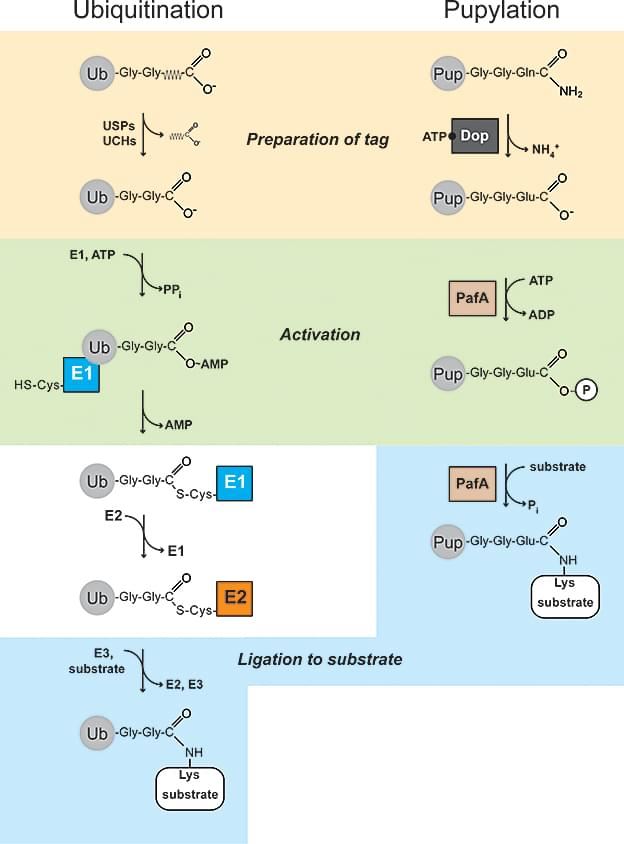Creative Biolabs provides affinity isolated anti-pupylation antibodies which are qualified in detection, validation, and quantification of protein pupylation. With synthetic antigen of a carrier protein that has prokaryotic ubiquitin-like protein (Pup) modified residues, specific pupylation antibodies are able to be generated with our excellent High-Affi™ technology.
Pupylation is a prokaryotic post-translational modification of proteins with the process of the small protein Pup (prokaryotic ubiquitin-like protein) through its C-terminal residue covalently attaching to target protein lysines via an isopeptide bond. Like eukaryotic ubiquitination, pupylation serves as a target for protein degradation. Despite using the proteasome as the end-point for proteolysis, Pup differs from ubiquitin both biochemically and structurally. In contrast to the three-step reaction of ubiquitination, pupylation requires two steps. First, Pup is rendered competent for attachment by Dop via deamidation at its C-terminal Gln. Conversely, ubiquitin needs to expose the C-terminal di-glycine motif via proteolytic processing before attachment. And then the attachment of deamidated Pup to a proteasomal substrate is mediated by the action of PafA. Pup is attached to a lysine side chain of a substrate protein via either the α- or γ-carboxy-terminal glutamate (GGE). It is not known if poly-pupylation occurs.
Pupylation, along with many other post-translational modifications, is a reversible process that PafA catalyzes the conjugation of Pup to substrates, whereas Dop removes Pup from substrates. The substrate and Pup are chemically unchanged after a cycle of pupylation and depupylation. Although the activities and mechanism of pupylation pathway are clear, the principles in the pathogenesis of Mycobacterium tuberculosis (Mtb) are still not completely understood. Some subsequent studies have shown that pupylation and the mycobacterial proteasome are crucial elements that help the organism to strive against clearance by the macrophages they occupy. Under the condition of multi-drug resistant and extremely drug resistant of Mtb strains, the involvement of pupylation and proteasomal degradation in Mtb pathogenesis is considered to be an attractive potential drug target.
 Fig. 1 Schematic overview of ubiquitination in eukaryotes and the bacterial pupylation pathway. (Imkamp et al. 2010)
Fig. 1 Schematic overview of ubiquitination in eukaryotes and the bacterial pupylation pathway. (Imkamp et al. 2010)
Creative Biolabs has developed high-quality antibody set for protein pupylation sites. Antibodies are produced by phage display technology with a Pup engineered peptide. Specific pupylation antibodies purified by protein A and affinity chromatography are available to be used in multiple applications (WB, IP, IHC-P, IF-IC, E-P, ChIP).
In addition to the pupylation-specific antibody, Creative Biolabs also provides a comprehensive list of PTM-specific antibody production services of your choice.
Reference
All listed services and products are For Research Use Only. Do Not use in any diagnostic or therapeutic applications.